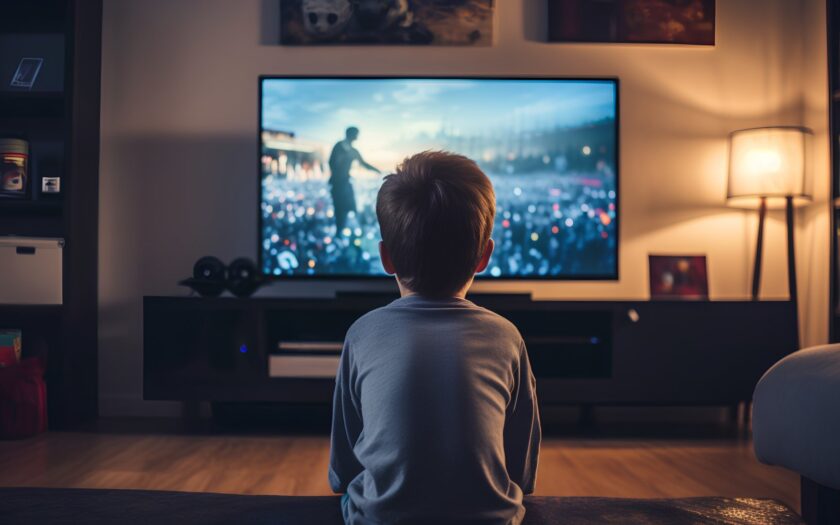Television has become an integral part of modern life, having a significant impact on various aspects of our everyday life. In the context of raising children, the question of the impact of television on young viewers becomes especially relevant. On the one hand, television can provide educational programs and a variety of developmental opportunities, but on the other hand, it is associated with the risk of potential negative consequences. In this article we will look at both the benefits and possible harmful aspects that television can have on children’s health and development.
The benefits of TV for a child
High-quality educational programs can promote the development of cognitive skills such as perception, attention, memory and reasoning. Language programs can help children expand their vocabulary, improve their literacy skills, and develop their ability to express themselves. Other advantages of TV for a child:
- stimulation of interest in the world. Television programs about nature, science and exploration can make children interested in the world around them and science;
- interactive elements. Some educational programs offer interactive activities and games, encouraging the child’s active participation in the learning process;
- social adaptation. Programs that represent a variety of social situations can promote social skills and empathy;
- communication and language development. High-quality children’s programs can contribute to expanding a child’s vocabulary and enriching his language skills. The opportunity to discuss the materials viewed with parents promotes the exchange of opinions and the development of communication.
However, despite these positive aspects, it is important to emphasize that parental supervision and limiting screen time are critical to avoid potential negative consequences on a child’s health and development.
How can TV be harmful to a child?
Long periods of time in front of the TV can promote a sedentary lifestyle, which can affect a child’s physical activity and lead to obesity problems. Other disadvantages of TV for a child:
- insulation. Prolonged time spent in front of a screen can lead to isolation from real social interactions, which negatively impacts the development of social skills;
- psychological impact. Some programs may contain aggressive scenes or inappropriate content, which may affect the child’s emotional state;
- sleep and daily routine. Watching TV for long periods of time before bed can disrupt normal sleep patterns, which affects your overall physical and emotional well-being;
- addiction. Too much dependence on TV can lead to difficulty managing screen time and distract you from more important activities such as studying and active games;
- risk of negative impact of advertising. Children may be exposed to advertising that may lead to inappropriate consumption habits or unbalanced worldviews;
- limited content control. The possibility of accidental exposure to obscene or inappropriate content can be problematic and requires parental vigilance.
Awareness of these shortcomings allows parents to make more informed decisions about their children’s TV time and manage content to maximize the positive impact on their child’s development.
How long can a child watch TV?
The American Academy of Pediatrics (AAP) recommends that children aged 2 to 5 years old should have no more than one hour of screen time per day, including watching TV. For children younger than 18 months, screen time, including television viewing, is not recommended except for video chatting.
For older children and adolescents aged 6 years and older, the AAP suggests setting consistent limits on screen time and ensuring that it does not interfere with adequate sleep, physical activity, and other important activities such as homework, socializing, and family time.
Ultimately, the appropriate amount of TV viewing time for a child depends on various factors such as their age, individual needs, and family routines. It’s important for parents to monitor and regulate their child’s screen time to ensure a healthy balance between screen-based activities and other aspects of their development and well-being.
How to stop a child from constantly watching TV?
Stopping a child from constantly watching TV requires a combination of strategies to encourage alternative activities and establish healthy screen time habits. Here are some tips:
- Set limits. Establish clear rules and limits on screen time, including TV viewing. Communicate these rules to your child and enforce them consistently. Use tools such as screen time apps or parental controls on devices to monitor and manage screen time effectively.
- Lead by example. Be a positive role model by limiting your own screen time and engaging in alternative activities such as reading, hobbies, or outdoor play. Children learn by observing their parents’ behavior, so demonstrating healthy screen habits can encourage them to follow suit.
- Encourage alternative activities. Provide a variety of engaging and stimulating activities for your child to enjoy instead of watching TV. This could include outdoor play, sports, arts and crafts, board games, reading, imaginative play, or spending time with family and friends.
- Create screen-free zones. Designate specific areas of your home, such as the dining room or bedrooms, as screen-free zones where TVs and electronic devices are not allowed. This can help reduce the temptation to watch TV constantly and promote alternative activities.
- Provide structure and routine. Establish a daily schedule that includes dedicated time for homework, chores, physical activity, and other non-screen activities. Having a structured routine can help reduce excessive screen time and encourage a balanced lifestyle.
- Offer rewards and incentives. Encourage your child to limit TV time by offering rewards or incentives for engaging in alternative activities or meeting screen time limits. This could include earning privileges such as extra playtime, a special outing, or a small reward.
- Engage in joint activities. Spend quality time with your child by participating in activities together that do not involve screens. This could include cooking together, going for walks or bike rides, playing board games, or working on a puzzle.
- Provide educational alternatives. If your child enjoys watching TV for educational content, explore alternative educational activities such as visiting museums, attending classes or workshops, or exploring educational apps and games that promote learning in a hands-on way.
- Communicate openly. Talk to your child about the importance of balancing screen time with other activities and the potential negative effects of excessive screen time on health and well-being. Encourage open communication and involve your child in setting screen time limits and goals.
- Seek professional help if needed. If your child’s excessive TV watching is causing significant disruptions or challenges, consider seeking advice from a pediatrician, child psychologist, or family therapist for additional support and guidance.
By implementing these strategies consistently and providing a supportive environment, you can help your child develop healthy screen time habits and reduce their reliance on constant TV watching.



